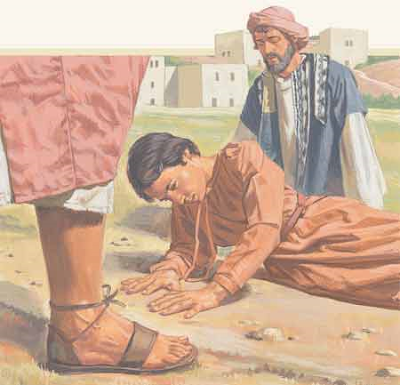___________________
St. John, throughout his Gospel never refers to miracles. Instead he calls these acts of Jesus "signs." As we read the Gospels of the other three evangelists, it would be good for us to recall this.
After all, a sign is really a message, isn't it? But it's a message that points to something greater than itself. This is exactly what we encounter in today's passage from Matthew: not just a healing, but a sign that points to something else, something greater. And that greater thing is discipleship, a discipleship grounded in faith.
I find it remarkable that those who come to Jesus for healing inevitably have much greater faith than His disciples. It's particularly apparent in this passage.
A man comes to Jesus, kneels before Him, and utters that most fundamental of Christian prayers, "Lord, have mercy..." (Kyrie, eleison...) [Mt 17:15] That prayer is an open declaration, an act of faith, that sees God's presence in the very person of Jesus.
But even more telling is that the man comes to Jesus not for himself but for another, for his son. He says his son is a lunatic, which at the time meant "moon-struck" or a reaction to the phases of the moon. This was the medical diagnosis of the time. Today we'd simply say, "epilepsy" - a condition involving convulsions that can endanger the sufferer.
But as Jesus heals we encounter a surprising revelation, don't we? The medical diagnosis is apparently wrong, because Jesus treats it as a case of demonic possession. It takes Him to identify the true spiritual illness afflicting the man's son and to point out the presence of the Evil One.
But regardless of his son's condition the man appeals to Jesus with deep faith. And through faith he knows he and his son are taking refuge in the very heart of God. Such is the power of the prayer: "Lord, have mercy."
The father goes on to mention the dangers of falling into fire and water, which call to mind that beautiful prophecy from beginning of chapter 43 of Isaiah:
When you pass through waters, I will be with you; through rivers, you shall not be swept away. When you walk through fire, you shall not be burned, nor will flames consume you [Is 43:2].Jesus brings this prophecy to life. He is with us in all things and suffers alongside us.
Just moments before Jesus had told the disciples, "the Son of Man must suffer..." [Mt 17:12], a prophecy He repeats immediately after this healing [Mt 17:22].
Yes, the Son of Man, the Redeemer, must suffer. He is the Redeemer because He takes on the sufferings of others, of all others, even before they experience them. He comes to us as one of us - Son of God and Son of Mary. And He carries within Himself the Father's love, the love that created each one of us. Jesus Christ, the Son, lives in our pain. He lives in our anguish. He lives in our suffering. And He brings us healing. He also lives in our sinfulness and brings us forgiveness. For what is forgiveness, but healing?
Notice, though, this man who came to Jesus wasn't sent or taken there by the disciples. No, he came on his own, driven by a faith stronger than that of the disciples. The disciples stand off, at a distance, scratching their heads, wondering, why couldn't we heal him? Perhaps the answer lies in the question itself...for we don't do the healing.
Jesus makes ir clear, doesn't He? The disciples could not heal the man's son because of "their little faith" [Mt 17:20], They're still caught up in their earthly lives. They're still focused on themselves and not of the sufferings of others.
We see this when, not long before this incident, Peter can confess, "You are the Messiah, the Son of the living God" [Mt 16:16], and moments later be rebuked by Jesus:
"Get behind me, Satan!...You are thinking not as God does, but as men do" [Mt 16:23].How can they expect to bring God's healing to others when they've yet to accept His healing presence in their own lives?
Brothers and sisters, as Jesus' disciples we can carry God's life to others only if we ourselves posses it.
Only when we accept, in humility, that gift of faith, that tiny mustard seed, can it grow and be fruitful.
Only then can it bring God's life into our lives and the lives of those we are called to love.



No comments:
Post a Comment